The
Reasons for Consuming a Vegetarian Diet in Lebanon
and the Survey of its Health Impacts
Evelyne M. Girgis
Correspondence:
Evelyne M. Girgis, Ph.D.
Lebanese University
Faculty of Education
Second Branch
Rawda, Beirut- Lebanon
Tel: 961-1-680382
Fax: 961-1-680193
Email: emgirgis@yahoo.com
|
Abstract
This
study addresses the reasons for adopting
vegetarianism and the health impacts of
a vegetarian diet on some people in Lebanon.
Results of this analysis will be used
to heighten the awareness of the public,
health care professionals, government
and health agencies on the positive attributions
of a vegetarian diet. A cross-sectional
study of developmental research was used
for this research which consisted of a
quantitative approach that used a questionnaire
filled by a random sample of respondents.
The people surveyed, or the respondents,
were individuals exposed (for any duration
of time) to any type of vegetarian diet.
The hypotheses were tested using frequency
analysis, chart analysis and cross-tabulation
using the Statistical Package for the
Social Sciences (SPSS). The researcher
concluded that most of the surveyed people
in Lebanon adopt vegetarianism or are
interested in this diet for health and
religious reasons primarily (specifically
Christians during Lent), for a temporary
period of time, and they believe it has
a positive effect on health especially
in preventing some diseases and feeling
generally better.
Key words: Vegetarian,
Lebanon, Health, Statistics
|
A vegetarian diet is a meal plan made up of
foods that come mostly from plants. These include
vegetables, fruits, whole grains, legumes, seeds,
and nuts. A vegetarian diet has little or no
animal products (new Appendix I). Types of vegetarian
diets include:
• Vegan: Diet consists of only plant-based
foods.
• Lacto-vegetarian: Diet consists
of plant foods plus some or all dairy products.
• Lacto-ovo vegetarian: Diet consists
of plant foods, dairy products, and eggs.
• Semi- or partial vegetarian: Diet
consists of plant foods and may include chicken
or fish (pesco-vegetarian), dairy products,
and eggs. It does not include red meat.
• Macrobiotic: Diet followed for
spiritual and philosophical reasons. It aims
to maintain a balance between foods seen as
yin or yang, and is mainly based on plant based
food.
Many researchers have reported a direct relationship
between a vegetarian diet and the prevention
of and curing several illnesses, such as: Hypertension,
Hypercholesterolemia and Hypertriglyceremia,
Obesity, Type 2 Diabetes and Heart diseases
[1-8].
Compared to non-vegetarians, vegetarians usually
eat:
• Fewer calories from fat (especially saturated
fat)
• Fewer overall calories
• More fiber, potassium, and vitamin C
In addition to celebrating World Vegetarian
Day ( October 1), it seems that more products
are showcasing vegetarian credentials in 2014.
New research from Mintel has found that 12%
of global food and drink products launched in
2013 carried a vegetarian claim, up from 6%
in 2009. Also, 2% of global food and drink launches
carried a vegan claim in 2013, up from 1% in
2009. Today in Britain, the vegetarian diet
is firmly on the map with 12% of UK adults following
a vegetarian or vegan diet, rising to 20% of
16 to 24s. This research reveals that almost
half (48%) of British people see meat-free products
as environmentally friendly and 52% see them
as healthy [9].
In Lebanon, vegetarianism has gained some popularity
over the past few years[10]. However, the exact
implications of this lifestyle on people in
this region are still unknown. This study addresses
the main reasons for consuming any form of a
vegetarian diet, and its health impacts on people
in Lebanon. However, the researcher will address
the social and economical impacts in future
publications. .
From a medical perspective, there is minimal
support from healthcare professionals encouraging
patients to adopt a vegetarian diet. Many medical
doctors in this region believe that diet has
no significant effects on curing most modern
illnesses. In spite of that belief, some do
think that certain foods might be one of many
factors that cause, cure or prevent certain
widespread degenerative illnesses. In building
awareness among doctors and health care specialists,
they will be able to see the major contribution
of a vegetarian diet in not only curing most
of today's sicknesses, but at least in relieving
symptoms and the decreased need for medication.
Medical specialists would then be able to combine
the best of both worlds by diagnosing, preventing
and treating disorders using conventional methods
(such as medication or surgery) and a balanced
diet.
This study will provide various medical and
health associations or government agencies in
this region with data to support the encouragement
of this diet, if it is followed in a balanced
way. Government health agencies would encourage
for instance the import and even production
of meat alternatives (that is still not always
accessible nor always feasible in Lebanon) by
decreasing import taxes and by amending some
of the import/export regulations regarding this
particular food stuff. In addition, health agencies
may encourage farmers to grow organic food and
ingredients needed to produce meat alternatives
(like soy or quinoa products) by providing them
with funds and preliminary resources at low
cost.
In recent decades, we have been witnessing a
rapid escalation in the percentage of degenerative
diseases due to several reasons, mainly adopting
the Western fast food diet and modern lifestyle.
With time, they have abandoned most of their
healthy traditional cuisine (mainly the Mediterranean
diet) and active lifestyle, heading towards
a more convenient, easy going and fast paced
lifestyle. This research will highlight for
the public the need for a solution- one that
is feasible, simple and can be applied in parallel
with a modern and technological way of living.
The answer is a vegetarian diet tailored for
people in Lebanon, mostly based on their varied
traditional vegetarian food and their seasonal
produce, that would improve their health status
significantly, encourage good quality social
interaction, and would actually decrease their
total expenses on food, medication and health
services.
The research followed
a quantitative approach
which consisted of a questionnaire
and the analysis and interpretation
of the generated data
with the help of Statistical
Package for the Social
Sciences (SPSS). The topic
of interest was studied
from a present point of
view to yield the desired
information. Therefore,
a cross-sectional study
of developmental research
was generally used.
a. Selected variables
for the study
The researcher covered
all the variables needed
in order to form a clear
understanding about the
subject and found that
it is essential to ask
first about personal information
regarding their gender,
age, occupation and so
on. Then, their knowledge
on any type of vegetarian
diet and the health impact
of vegetarianism on preventing
and curing their diseases
was investigated. And
as clearly stated in the
analysis below, two or
more of these different
variables together with
the help SPSS were linked.
The set of independent
variables investigated
in the research are:
1. GENDER
2. AGE
3. OCCUPATION
4. RELIGION
5. DURATION ON A VEGETARIAN
DIET
6. MAIN REASON FOR PRACTICING
VEGETARIANSIM
7. SPECIFIC HEALTH PROBLEMS
8. VEGETARIANSIM HELPS
GENERAL WELL-BEING
9. VEGETARIANSIM HELPS
CURE CERTAIN DISEASES
10. EFFECT OF A VEGETARIAN
DIET IN THE PROGRESSION
OR RELIEF OF DISEASES
b. Data Collection
and Analysis
The most common source
of data for such research
is communicating with
respondents. Thus, this
study used a set of questionnaires
filled by a random sample
of respondents. Since
the percentage population
who have followed a vegetarian
diet or have sufficient
knowledge of it is small,
only individuals that
have been exposed to this
diet were studied. A subject
data-gathering technique
would provide a deeper
and wider range of information.
For this reason, a one-on-one
survey was used. In addition,
the sample size was limited
to 930 individuals. The
samples were collected
from a few supermarkets
(near the organic and
produce sections), universities,
schools (staff) and at
gatherings (church events,
friendly lunches, etc...)
between Beirut, Kesserwan
and Northern Lebanon.
These places have residents
or frequent visitors of
different age groups and
from the main coastal
cities or surrounding
suburbs/villages.
c. Research Question
and Hypotheses
The main research questions
in this study are:
Q1: "Why do
people in Lebanon follow
a vegetarian diet?"
Q2: "Do people
in Lebanon who are acquainted
with a vegetarian diet
believe that this diet
has a positive effect
on their general well-being
and relief of undesirable
symptoms?"
Two main hypotheses, which
seemed reasonable from
the researcher's experience
and vegetarianism, were
formulated:
H1: More than 50%
of the Lebanese follow
a vegetarian diet for
religious and health reasons.
H2: More than 70%
of the Lebanese believe
that a vegetarian diet
has positive effects on
a person's health status.
To test the hypotheses,
frequency and percentage
analysis were useful to
diagnose the major characteristics
of the selected sample.
Also, cross tabulation
was crucial in determining
the relation and link
between the variables.
The use of the SPSS constituted
to the basis for conducting
such an analysis.
d. Scope and Limitations
There were several limitations
to this study such as
time and places from which
samples were collected.
The first major limitation
of this study was the
sample size. Choosing
people exposed to vegetarianism
from a random sample of
respondents to gather
data from, and then checking/organizing
the gathered data , the
researcher was bounded
with a set of 930 questionnaires.
Another limitation was
the fact that the researcher
had limited places from
which to gather information.
The researcher gathered
information from a few
places from the coast
of Beirut to the Northern
coast passing through
Kesserwan ; yet trying
to choose a diversified
sample from most parts
of Lebanon (targeting
a sampled population residing,
working in or visiting
these districts from suburbs
and surrounding villages).
A third limitation was
the integrity of the respondents,
in answering the questionnaires,
which plays a good deal
of importance in the efficiency
of the model.
The sample is composed
of 930 respondents.
According to the "normal
distribution theory",
the sample size lead
to results that have
a 2.8 % margin error
and 95% confidence interval[12].
All the results are
presented in charts
and tables obtained
from the outputs files
of the SPSS software.
Table 1: Main reasons
for Practicing Vegetarianism
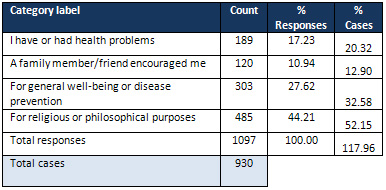
Chart 1: Main Reasons
for Practicing Vegetarianism
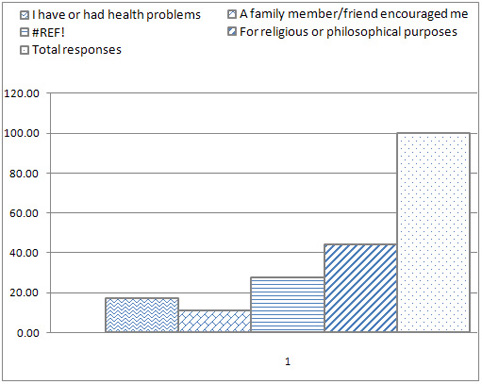
Table 2: Main Health
Problems Indicated by
the Sample Surveyed
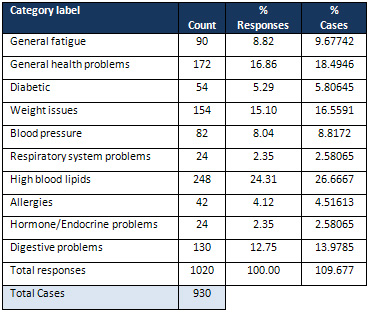
Chart 2: Main Health
Problems Indicated by
the Sample Surveyed
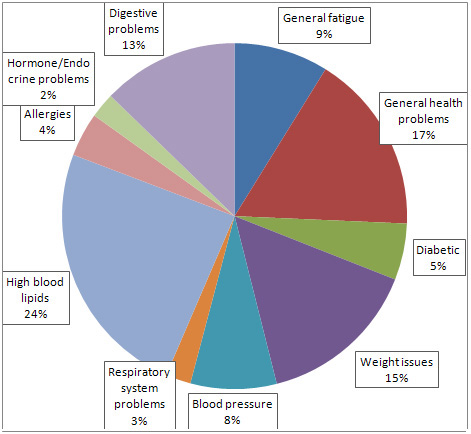
Table 3: How Vegetarianism
Affected Sample's Healing
Process
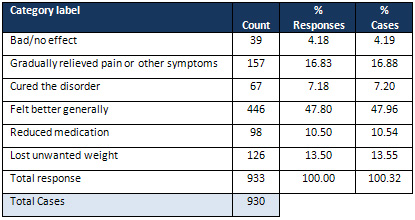
Chart 3: How Vegetarianism
Affected Sample's Healing
Process
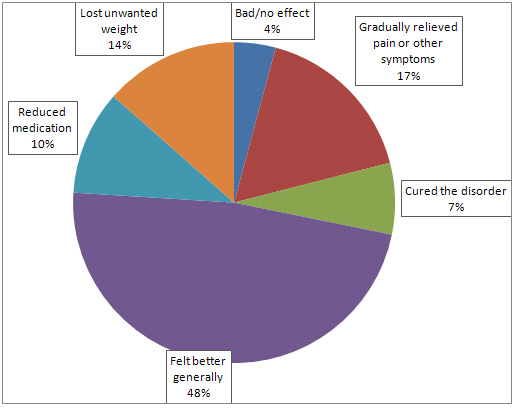
Table 4: Frequency
analysis of the "Age"
variable
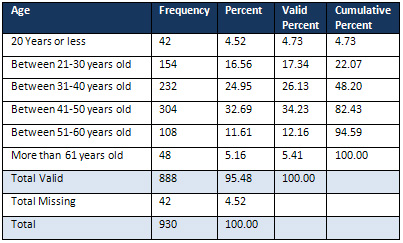
Table 5: Frequency
analysis of the "Duration
on Vegetarianism"
variable
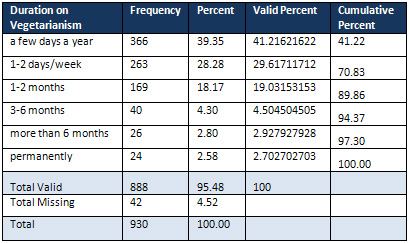
Table 6: Frequency
analysis of the "Occupation"
variable
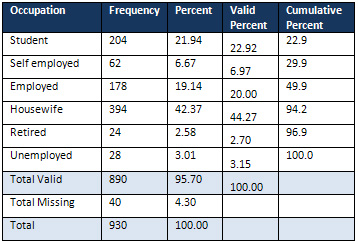
a. Data Analysis
& Testing
Analysis of data on
the personal information
variables is shown in
Tables 4 to 6:
• 60.36% of the
sample was between the
ages of 31 and 50 years
old Table 4).
• 22.92% of the
sample were students,
while 42.37% were housewives
(Table 6).
• 67.63% of the
sample consumed vegetarian
food either a few days
a year or a few days
a week (Table 5).
• Whereas Chart
1 shows that 54.3% of
the sample believe or
practice vegetarianism
because it complies
with their religious
or philosophical beliefs.
In this part, the researcher
focuses her analysis
on the more specific
variables that are related
to the above two hypotheses
(H1 and H2) and hence
tested both research
questions . There were
some multiple responses
to several questions
targeted. Thus, some
information was drawn
based on those responses.
Table 1 includes three
category questions serving
as reasons for consuming
a vegetarian diet:
• 17.23% of the
sample practices a form
of vegetarianism because
they have health problems.
• 44.21% of the
surveyed sample practice
vegetarianism for religious
or philosophical purposes.
• 27.62% of the
sample wants to prevent
possible health disorders
or for general well-being.
Therefore, hypothesis
H1 is accepted according
to the data shown in
Table 1. In addition,
Chart 3 clearly illustrates
that 71.81% of the sample
believes that a vegetarian
diet can cure, gradually
relieve symptoms of
certain diseases and
generally improve our
overall health. Therefore,
and according to the
data shown in this chart
hypothesis H2 is accepted.
According to this study
and based on the above
results, the answers
to the research questions
are: Most Lebanese consume
a vegetarian diet temporarily
for health and religious
reasons mainly. And
yes, people who consume
a vegetarian diet in
Lebanon believe that
this diet can cure,
prevent and relieve
symptoms of disorders.
The researcher looked
further into the type
of health problems that
the population is concerned
with and how a vegetarian
diet affects certain
ailments and health
concerns. By examining
the data in table 2,
25.68% of the sample
was concerned about
general health problems
and fatigue, while 15.10%,
24.31% and 12.75% were
concerned with weight
loss, high blood lipids
and digestive problems
respectively.
Table 3 shows the response
to the question: How
did a vegetarian diet
affect the healing process?
The majority felt better
generally(47.80% ) and
had gradual relief of
their symptoms (16.83%).
In addition, only 4.18%
felt that this diet
had no or bad effect
on them. (As a side
note, most of the 'bad'
effects were not grave:
hunger, dizziness or
uneasiness with cutting
out meat). An encouraging
13.50% indicated that
this diet helped them
lose a lot of unwanted
weight, while 10.50%
reduced their medication
intake.
| DISCUSSION
AND
CONCLUSIONS
|
According
to
this
study
where
both
hypotheses
H1
and
H2
were
accepted,
the
researcher
concluded
that
most
Lebanese
adopt
a
type
of
vegetarian
diet
or
are
interested
in
this
lifestyle
for
a
temporary
period
and
mainly
for
religious
and
health
reasons.
They
also
feel
it
has
a
positive
effect
on
their
health.
This
conclusion
is
based
on
the
following
reasons:
•
Some
people
in
Lebanon
have
resorted
to
vegetarian
food
for
religious
reasons,
mainly
Christians
(during
Lent
period
and
Wednesdays
&/or
Fridays
throughout
the
year).
•
Fewer
Lebanese
have
adopted
vegetarianism
based
on
certain
principles
and
a
belief
system
like
animal
rights
activists
or
simply
losing
confidence
in
the
sources
of
their
meat
or
dairy
products
and
correspondingly
their
safety
to
be
consumed
[10].
This
has
been
happening
in
the
recent
years
after
exposing
suppliers'
and
distributors'
unethical
and
unhygienic
practices
on
national
TV
news.
•
In
Lebanon,
a
fair
percentage
of
the
sample
surveyed
have
adopted
this
diet
since
they
themselves
or
their
relatives
suffer
from
ailments
and
found
this
diet
to
have
a
positive
effect
in
relieving
some
symptoms,
generally
feeling
better
and
reducing
the
intake
of
certain
medications.
Many
others
found
a
vegetarian
diet
(if
not
permanently,
at
least
at
certain
periods)
to
be
a
good
complementary
lifestyle
to
their
conventional
therapies.
•
Historically
speaking,
Arabic
medicine
roots
from
this
region
and
is
based
on
herbal
and
other
ancient
home
remedies
encouraging
the
consumption
of
more
vegetarian
food
in
combination
with
herbal
medicine
in
several
treatment
aspects.
Most
people
in
Lebanon
find
it
easier
to
surrender
to
the
westernized
lifestyle
,
modern
medicine
and
taking
little
part
in
the
treatment
process.
Relieving
symptoms
as
quick
as
possible
by
taking
medication
seems
to
be
a
habit.
Changing
your
diet
and
removing
meat
products
seems
very
challenging
and
limiting
to
most
of
them
since
it
entails
taking
one's
health
into
one's
own
hands,
making
major
diet
and
lifestyle
changes,
not
to
mention
amending
the
menu
for
weekend
family
barbeques
(which
seems
to
be
a
hobby
for
many)
and
changing
habits
while
tolerating
some
withdrawal
symptoms
like
hunger
and
cravings.
Therefore,
from
the
health
point
of
view,
a
vegetarian
diet
(specially
the
semi-vegetarian
or
lacto-vegetarian)
will
most
likely
be
adopted
by
Lebanese
during
certain
periods
and
not
permanently,
usually
in
cases
of
religious
purposes
(Christian
Lent)
and
major
illnesses
that
mandate
the
abstinence
of
meat
and
high
fat
dairy
product
for
a
certain
period
of
time.
Rarely
will
few
Lebanese
adopt
being
strict
vegans
on
a
more
permanent
basis.
Thus,
the
researcher
concluded
that
many
people
in
Lebanon
look
upon
vegetarianism
as
a
temporary
diet
rather
than
a
permanent
one
or
to
be
applied
a
few
times
a
week/month.
This
research
implies
that
most
people
in
Lebanon
are
more
interested
in
its
health,
religious
and
diet
facets.
This
can
be
emphasized
since
a
vegetarian
diet
in
general
has
several
positive
effects
on
a
person's
health
status
even
when
a
disorder
is
involved.
Contrary
to
modern
belief,
a
vegetarian
diet
(rich
in
whole
grains
and
beans)
provides
more
strength
and
endurance
than
a
modern
meat
and
sugar
diet.
In
many
cases,
it
reduces
the
need
for
medication,
slowly
relieves
some
undesirable
symptoms,
improves
general
well-being
and
decreases
the
need
for
conventional
medical
therapies.
Several
medical
doctors
praise
the
vegetarian
diet
for
its
low
fat,
sugar
and
caloric
properties.
In
addition,
a
vegetarian
diet
is
high
in
fiber
and
complex
carbohydrates.
When
you
omit
processed
foods,
you
begin
to
strengthen
your
immune
system.
Vegetarian
diets
offer
a
number
of
advantages,
including
lower
levels
of
saturated
fat,
cholesterol,
and
animal
protein
with
higher
levels
of
carbohydrates,
fiber,
magnesium,
boron,
folate,
antioxidants
such
as
vitamins
C
and
E,
carotenoids,
and
phytochemicals
[
9].
These
diets
also
provide
health
benefits
in
the
prevention
and
treatment
of
certain
ailments
(specifically
hypertension,
hypercholesterolemia,
diabetes,
etc)
.
The
key
to
reaping
the
benefits
of
a
vegetarian
diet
is
in
the
understanding
of
the
phrase
"appropriately
planned,"
meaning,
identifying
the
key
nutrients
deficient
and
finding
ways
to
supplement
them.
On
the
other
hand,
the
major
concerns
are
that
strict
vegetarian
diets
(like
vegans)
may
be
low
or
lacking
in
protein,
Vitamin
B12,
calcium,
omega
3,
iron,
and
Vitamin
D.
So
there
are
certain
key
points
to
consider
for
avoiding
the
drawbacks
of
a
vegan
diet.
Lacto
-ovo
and
semi-vegetarian
diets
are
at
a
very
low
risk
of
developing
these
nutrient
deficiencies.
Vegetarians
could
easily
meet
their
protein
needs
by
eating
a
varied
diet,
as
long
as
they
consume
enough
calories
to
maintain
their
weight.
It
is
not
necessary
to
plan
combinations
of
foods.
A
mixture
of
proteins
throughout
the
day
will
provide
enough
essential
amino
acids
[11].
Thus
complementary
proteins
(i.e.
rice
and
beans)
do
not
need
to
be
consumed
at
the
same
meal
[14].
Most
importantly,
the
quality
of
plant
protein
varies:
whereas
soy
protein
can
meet
protein
needs
as
effectively
as
animal
protein,
wheat
protein
eaten
alone
may
be
50%
less
usable
than
animal
protein
[15].
So
for
semi-vegetarians,
seafood,
especially
white
fish
and
sometimes
salmon
or
tuna,
if
consumed
1-3
times
per
week,
will
benefit
the
diet
with
a
good
source
of
protein
and
omega
3
fatty
acids.
In
general,
sources
of
protein
for
all
vegetarians
should
include
beans,
lentils,
tofu,
nuts,
seeds,
tempeh,
chickpeas
and
peas.
In
addition,
whole
grain
bread,
cereals,
low
fat
dairy
and
other
common
foods
may
also
add
to
protein
intake.
Iron
needs
will
vary
most
likely
from
individual
to
individual
based
on
the
makeup
of
their
overall
vegetarian
diet.
Recommended
iron
intakes
for
vegetarians
are
1.8
times
those
of
non-vegetarians
because
of
lower
bioavailability
of
iron
from
a
vegetarian
diet
[11].
Iron
sources
for
vegetarians
include
dried
beans,
tofu,
lentils,
tempeh,
spinach,
chard,
baked
potatoes,
cashews,
dried
fruits,
bulgur,
and
iron-fortified
foods
(such
as
cereals,
instant
oatmeal,
and
veggie
"meats").
Plant
foods
contain
only
non-heme
iron,
which
is
more
sensitive
than
heme
iron
to
both
inhibitors
and
enhancers
of
iron
absorption.
Inhibitors
include
phytate,
calcium,
teas,
coffee,
cocoa,
and
fiber,
while
enhancers
include
vitamin
c
and
other
organic
acids.
To
increase
the
amount
of
iron
absorbed
at
a
meal,
eat
a
food
containing
vitamin
C,
such
as
citrus
fruit
or
juices,
tomatoes,
or
broccoli.
Using
iron
cookware
also
adds
to
iron
intake
[16
].
Calcium,
the
main
mineral
in
bones,
plays
an
important
role
in
bone
health.
Children
whose
diets
are
low
in
calcium
may
develop
osteoporosis
as
adults
and
have
a
greater
risk
of
breaking
bones.
Some
studies,
although
not
all,
have
shown
that
older
adults
with
a
high
calcium
intake
have
stronger
bones
and
a
lower
fracture
risk.
There
is
a
limited
number
of
studies
on
vegans,
most
of
which
find
low
bone
density
as
well
as
low
calcium
intakes[19-20].
One
study,
where
vegans
had
calcium
intakes
close
to
recommended
levels,
found
that
calcium
was
well-absorbed
from
a
vegan
diet[21].
Calcium
is
present
in
many
plant
foods
and
fortified
foods.
Low
oxalate
greens
(bokchoy,
broccoli,
Chinese/Napa
cabbage,
collards,
kale,
okra,
turnips
greens)
provide
calcium
with
high
bioavailability
(49-61%)
in
comparison
with
calcium
fortified
juices,
tofu,
and
cow's
milk
(31-32%),
and
with
fortified
soymilk,
sesame
seeds,
almonds,
and
red
and
white
beans
(21-24%)
[17].
However,
oxalates
present
in
some
foods
can
greatly
reduce
calcium
absorption,
so
vegetables
that
are
high
in
oxalates,
such
as
spinach
and
beets
are
not
good
sources
of
usable
calcium
despite
their
high
calcium
content
[11].
The
ADA
recommends
that
vegetarians
meet
the
recommended
intakes
for
calcium
by
consuming
at
least
eight
servings
per
day
of
foods
that
provide
10-15%
of
the
adequate
intake
for
calcium
as
indicated
in
the
Vegetarian
Food
Guide
Pyramid
(see
Appendix
I).
For
vegetarians
who
do
not
want
to
include
dairy
products
in
their
diet,
they
are
advised
to
consume
calcium-enriched
products
(like
orange
juice
and
rice
milk),
leafy
green
vegetables,
grains,
nuts,
tofu,
pumpkin
seeds,
and
soy
drinks.
It's
not
enough
to
have
a
high-calcium
diet;
adequate
vitamin
D
is
needed
for
calcium
to
be
absorbed.
Vitamin
D
is
necessary
throughout
life
to
help
build
strong
bones
in
childhood
and
adolescence
and
to
maintain
bones
throughout
adulthood[19].
Vitamin
D
status
depends
on
sunlight
exposure
and
intake
of
vitamin
D
fortified
foods
or
supplements.
Sun
exposure
to
the
face,
hands,
forearms
and
legs
for
5-15
minutes
per
day
during
the
summer
is
believed
to
provide
sufficient
amounts
of
vitamin
D
for
light
skinned
people,
while
darker
skinned
people
require
longer
exposure
[18
].
Nevertheless,
many
factors,
including
season,
time
of
day,
age,
sunscreen
use,
and
pollution,
can
interfere
with
this
production.
Some
vegetarian
food
that
is
fortified
with
vitamin
D
includes
soymilk,
rice
milk,
and
some
breakfast
cereals.
Therefore,
if
sun
exposure
and
intake
of
fortified
foods
are
insufficient,
then
vitamin
D
supplements
are
recommended
[13].
Despite
the
fact
that
vitamin
B12
has
a
low
recommended
daily
intake,
it
is
still
an
essential
nutrient
(with
undesirable
deficiency
symptoms)
encouraging
vegetarians
to
familiarize
themselves
and
consume
a
variety
of
good
sources.
Fortified
foods,
such
as
some
brands
of
cereal,
nutritional
yeast,
soymilk,
or
veggie
"meats,"
are
good
non-animal
sources
[11].
A
balanced
vegetarian
diet
may
also
contain
tempeh
and
natto
(forms
of
fermented
soybeans)
that
are
rich
in
Vitamin
B12.
To
be
on
the
safe
side,
vegetarians
should
consume
a
supplement,
fortified
food,
dairy
product,
or
eggs
to
meet
recommended
intakes
of
vitamin
B12
especially
pregnant,
lactating
women
and
for
breastfed
infants
if
the
mother's
diet
is
not
supplemented.
Tempeh,
miso,
sea
vegetables,
and
other
plant
foods
are
sometimes
reported
to
contain
vitamin
B12.
These
products,
however,
are
not
reliable
sources
of
the
vitamin.
The
standard
method
for
measuring
vitamin
B12
in
foods
measures
both
active
and
inactive
forms
of
vitamin
B12.
The
inactive
form
(also
called
analogues)
actually
interferes
with
normal
vitamin
B12
absorption
and
metabolism
[22].
When
only
active
vitamin
B12
is
measured,
plant
foods
including
fermented
soyfoods
and
sea
vegetables
do
not
contain
significant
amounts
of
active
vitamin
B12
[23].
The
researcher
truly
believes
that
a
well-balanced
vegetarian
or
at
least
a
semi-vegetarian
diet
will
be
successful
in
Lebanon
and
the
market
for
its
organic
and
meat-alternative
products
will
grow
noticeably
in
the
near
future.
If
not
abiding
100%
with
a
vegetarian
diet,
a
well-balanced
diet
based
mostly
on
plant-based
food,
could
simply
be
applied,
most
essentially:
eating
organic
seasonal
food,
mostly
vegetarian
food
(whole
grains,
beans,
legumes,
seaweeds,
vegetables),
eating
according
to
our
seasonal
needs,
exercising,
avoiding
fast
food
and
processed
food,
etcTherefore,
the
Lebanese
government
and
health
agencies
should:
•
Support
organized
import
and
export
regulations
regarding
organic
foods,
meat-alternatives
and
dairy-substitutes.
•
Encourage
farmers
to
grow
organic
food
and
to
produce
meat
and
dairy
alternatives.
•
Cooperate
with
local
and
international
vegetarian
associations
or
experts
to
organize
workshops,
conferences
and
research
programs.
| SUMMARY
AND
OVERALL
RECOMMENDATIONS
|
People
who
are
interested
in
a
vegetarian
diet
or
are
knowledgeable
about
it
believe
that
this
diet
can
improve
their
general
well-being,
yet
find
it
difficult
to
find
healthy
meat/dairy
alternatives
and
to
follow
a
balanced
nutrient-rich
diet.
Therefore,
providing
them
with
healthy
substitutes
and
simple
tips
would
be
very
beneficial.
The
following
are
some
substitutes
for
animal
products
available
in
natural
foods
stores,
Asian
food
stores
or
specified
aisles
in
big
supermarkets
:
**Meat
substitutes
in
soups
or
stews
:
•
Tempeh
(cultured
soybeans
with
a
chewy
texture)
•
Tofu
(a
bean
curd;
freezing
and
then
thawing
gives
tofu
a
meaty
texture;
tofu
will
turn
slightly
off-white
in
color)
•
Wheat
gluten
or
seitan
(made
from
wheat
and
has
the
texture
of
meat;
great
for
vegan
'shawarma'
)
**Egg replacers (binders)
• Ener-G Egg
Replacer (or similar products)
• 1 small
banana for 1 egg (great
for cakes & pancakes)
• 2 Tablespoons
cornstarch or arrowroot
starch for 1 egg
• ¼
cup tofu for 1 egg (Blend
tofu smooth with the liquid
ingredients before they
are added to the dry ingredients)
**Dairy substitutes
in cooking
• Soymilk
• Rice, coconut,
almond, and other nut
milks
• Rice cheese,
almond cheese or soy based
cheese
• Soy margarine
• Soy or almond
yogurt
• Soy sour
cream
• Spreadable
tofu (mashed and flavored
with thyme, olive oil
or other flavors; great
in sandwiches)
To maximize production
of DHA and EPA (omega-3
fatty acids found in fish
and made by our bodies),
include good sources of
alpha-linolenic acid in
your diet. Alpha-linolenic
acid is found in flaxseed,
flaxseed oil, canola oil,
tofu, soybeans, and walnuts.
You can also obtain DHA
directly from foods fortified
with DHA from microalgae
(in some brands of soymilk)
and supplements containing
microalgae-derived DHA.
In conclusion, it is
imperative that practitioners
educate patients on the
importance of maintaining
proper nutrition, keeping
continuous surveillance
for signs of nutritional
deficiencies and to never
avoid necessary medical
consultation. If you choose
a vegetarian lifestyle,
consuming yeast extracts,
soy products, spreads
without animal fats and
enriched whole grains
is helpful. In that case,
you could also add high
quality supplements depending
on your need like a multivitamin,
B Complex vitamins, vitamin
B12, vitamin D, calcium,
magnesium, iron or omega
3 fatty acids.
1.
American
Dietetic
Association.
Position
of
the
American
Dietetic
Association:
Vegetarian
diets.
J
Am
Diet
Assoc.
2009;109:1266-1282.
2.
Craig
WJ.
Nutrition
concerns
and
health
effects
of
vegetarian
diets.
Nutr
Clin
Pract.
2010;25:613-620.
3.
Thedford
K,
Raj
S.
A
vegetarian
diet
for
weight
management.
J
Am
Diet
Assoc.
2011;111:816-818.
4.
United
States
Department
of
Agriculture.
Center
for
Nutrition
Policy
and
Promotion.
Dietary
Guidelines
for
Americans.
2010.
National
Academy
Press,
Washington,
D.C.
2010.
5.
Smith
SC,
Jr.
Current
and
future
directions
of
cardiovascular
risk
prediction.
Am
J
Cardiol.
Jan
16
2006;97(2A):28A-32A.
6.
Buckley
DI,
Fu
R,
Freeman
M,
Rogers
K,
Helfand
M.
C-reactive
protein
as
a
risk
factor
for
coronary
heart
disease:
a
systematic
review
and
meta-analyses
for
the
U.S.
Preventive
Services
Task
Force.
Ann
Intern
Med.
Oct
6
2009;151(7):483-495.
7.
Food
Labeling:
Health
Claims;
Soy
Protein
and
Coronary
Heart
Disease.
Federal
Register:
(Volume
64,
Number
206)];
1999.
p.
57699-733.
8.
Mitchell
DC,
Lawrence
FR,
Hartman
TJ,
Curran
JM.
Consumption
of
dry
beans,
peas,
and
lentils
could
improve
diet
quality
in
the
US
population.
J
Am
Diet
Assoc.
2009
May;109:909-13.
9.
"Mintel:
vegetarian
launches
have
doubled
in
five
years".
Ingredients
Network.
10/2/2014
<http://ingredientsnetwork.com/News/Show/865/Mintel_3a_vegetarian_launches_
have_doubled_in_five_years?cid=iN_ema_nws_vis_8oct2014_informer41>.
10.
"
Vegetarian
diet
gains
popularity
in
Lebanon".
The
Daily
star.
Oct.
16,
2004.
<http://www.dailystar.com.lb/News/Lebanon-News/2004/Oct-16/2912-vegetarian-diet-gains-popularity-in-lebanon.ashx#ixzz3Fq8jlbpc>
.
11.
"Position
of
the
American
Dietetic
Association:
Vegetarian
Diets,"
JADA,
July
2009.
12
.
Churchill
A,
Iacobucci
D.
Marketing
research:
Methodological
foundations
(8th
ed.).
South
Western
College
Pub.;
2001.
13.
American
Dietetic
Association;
Dietitians
of
Canada.
Position
of
the
American
Dietetic
Association
and
Dietitians
of
Canada:
Vegetarian
diets;
Journal
of
the
American
Dietetic
Association:
2003
June;
103(6):
pp.748-765
.
14.
VR
Young
and
PL
Pellett.
Plant
proteins
in
relation
to
human
protein
and
amino
acid
nutrition.
Am
J
Clin
Nutr
59
(1994),
pp.
1203S-1212S.
15.
VR
Young,
L
Fajardo,
E
Murray,
WM
Rand
and
NS
Scrimshaw.
Protein
requirements
of
man:
Comparative
nitrogen
balance
response
within
the
submaintenance-to-maintenance
range
of
intakes
of
wheat
and
beef
proteins,
J
Nutr
105
(1975),
pp.
534-542.
16.
RF
Hurrell,
M
Reddy
and
JD
Cook.
Inhibition
of
non-haem
iron
absorption
in
man
by
polyphenolic-
containing
beverages,
Br
J
Nutr
81
(1999),
pp.
289-295.
17.
C
Weaver,
W
Proulx
and
R
Heaney.
Choices
for
achieving
adequate
dietary
calcium
with
a
vegetarian
diet.
Am
J
Clin
Nutr
70
(1999),
pp.
543S-548S.
18.
Feskanich
D,
Willett
WC,
Colditz
GA.
2003.
Calcium,
vitamin
D,
milk
consumption,
and
hip
fractures:
a
prospective
study
among
postmenopausal
women.
Am
J
Clin
Nutr
77:504-11.
19.
Marsh
AG,
Sanchez
TV,
Michelsen
O.
1988.
Vegetarian
lifestyle
and
bone
mineral
density.
Am
J
Clin
Nutr
48
(suppl):837-41.
20.
Chiu
JF,
Lan
SJ,
Yang
CY,
et
al.
1997.
Long-term
vegetarian
diet
and
bone
mineral
density
in
post-menopausal
Taiwanese
women.
Calcif
Tissue
Int
60:245-49.
21.
Kohlenberg-Mueller
K,
Raschka
L.
2003.
Calcium
balance
in
young
adults
on
a
vegan
and
lactovegetarian
diet.
J
Bone
Miner
Metab
21:28-33.
22.
Herbert
V.
Vitamin
B12:
Plant
sources,
requirements,
and
assay.
Am
J
Clin
Nutr
1988;48:852-858.
|

